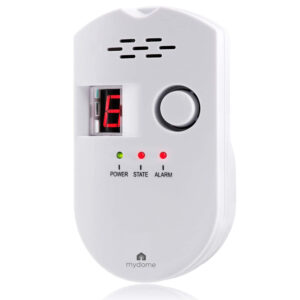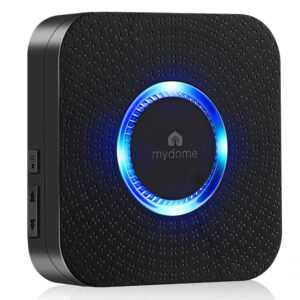What is natural gas?
Natural gas is a colourless non-toxic hydrocarbon. In modern homes it is very popular for heating and cooking purposes. A cosy warm home, a comforting stew in winter, or grilling some burgers on the barbecue are the easiest ways to think of how we utilise natural gas in our everyday lives.
Natural gas is an easy to use, reliable energy source that compliments electric power and is now ubiquitous in helping facilitate our modern way of living.
Natural gas & LPG (liquid petroleum gas) are highly combustible and when the concentration is high enough they can become explosive. The lowest concentration point at which the combustible gas may become explosive is called the Lower Explosive Limit (LEL). The LEL percentage is usually the number quoted on any reliable gas detector or gas alarm.
Natural Gas which is primarily Methane (CH4), sometimes referred to as swamp gas is lighter than air and will rise
LPG gas has a lower density than air and will linger around floor level. Examples of LPG gas are: propane, butane urban coal gas (alkane, olefin, arenas)
What is a natural gas detector?
A natural gas detector / gas alarm is used to detect a gas leak from a variety of combustible gases usually within the home. Gas alarms can be used in lots of different indoor environments where gas usage is present such as caravans / RV’s, takeaways, restaurants and offices. It is important to note that natural gas detectors are not designed to detect toxic gases such as carbon monoxide (CO2)
Natural gas detectors usually detect both natural gas and LPG.

Natural gas is colourless and in most instances odourless so a gas alarm provides users with an early warning when it detects gas in the air. Depending on features, a gas detector can have both an audible and visual alert system to notify nearby people of the presence of gas.
Hand held gas detectors
Gas alarms can be handheld battery powered devices and are usually used by gas experts. Handheld gas detectors will work when switched on and can usually identify the source of a leak when that source is hidden in piping behind a wall.
Plug-in gas detectors
A more popular choice used by household users are plug-in devices that remain permanently powered and continuously monitor for gas in the air. They are important to detect sudden changes in the air usually caused by appliances such as cookers not being turned off. When plug-in gas detectors are used they will identify slower leaks often found in piping behind the walls as concentration levels in the air increase.
Is a natural gas detector necessary?
Investing in a natural gas detector or a combustible gas alarm is essential for anyone using natural gas. In most modern homes the presence of large appliances such as cookers and stoves all but guarantees the presence of gas with the risks associated with them increasing too. Having an alarm or a gas detector that will inform the user of gas in the air before it reaches dangerous, combustible levels is important.
Due to the different gas densities, a user should identify the most likely gas that will leak and position their gas detector accordingly.

What should I do if I smell natural gas at home?
If a person smells natural gas or if their natural gas detector notifies them of a gas leak it is important to immediately try and locate the source of the leak and stop it / turn off the appliance.
All windows and doors should be opened immediately to allow fresh air to enter the area and displace the natural gas in the air.
For users who use a plug-in natural gas detector see if the LEL (lower explosive limit) on the screen reduces after appliances have been turned off. If the natural gas level decreases as shown on the gas alarm then continue to leave windows open until the LEL limit drops to 0.
If the LEL limit of the screen continues to rise or remains static at its peak display figure (usually just an “A”) then immediately turn off the gas supply mains and leave the premises until it is deemed safe to re-enter. Call an emergency gas engineer once safely out of the premises.
Those individuals who do not have a natural gas detector should vacate the premises after turning off the main gas supply before calling a gas expert for further advice.
mydome gas detectors and gas alarms
-
Smoke Alarms
Shield Natural Gas Leak Detector With A Loud Alarm & Digital Display, Designed To Detect Combustible Gas Leaks Including LPG, Butane, Propane & Methane In The Home
Rated 4.67 out of 5£23.99Original price was: £23.99.£19.99Current price is: £19.99.
-
Doorbells
Midnight Square Stand Alone Plug-in Receiver – Compatible With All mydome Doorbell & Motion Sensor Kits
Rated 5.00 out of 5£19.99Original price was: £19.99.£14.99Current price is: £14.99.



Great article with some helpful advice.
The cooker in our home has been left on recently a few times so the gas detectors certainly seem like a good solution.
I guess for gas leaks in pipes or behind walls the hand held devices are good but for more general use in the home a permant plugged in alarm is much better suited to detect a gas leaks caused by forgetfulness.